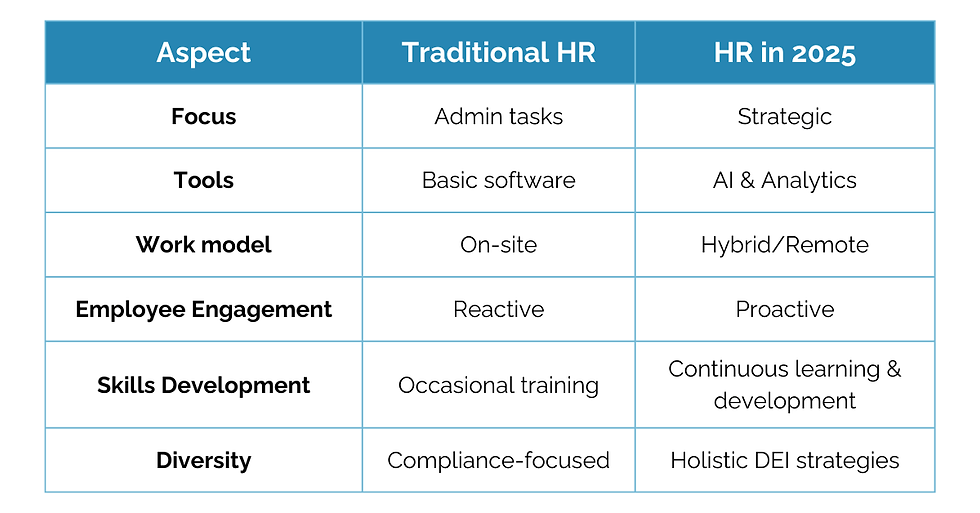The role of Human Resources (HR) has undergone a significant transformation over the years, particularly as businesses adapt to evolving workplace dynamics, advancements in technology, and ever-changing employee expectations.

HR roles today are markedly different from traditional practices of the past. This article explores these differences, with a focus on emerging trends and new responsibilities for HR professionals.
Traditional HR Roles - An Overview
Historically, HR in the UK was largely administrative and operational. Key responsibilities included:
Recruitment and Onboarding: Handling job advertisements, screening candidates, and managing onboarding processes.
Payroll and Benefits Administration: Ensuring employees were paid accurately and on time, while managing benefits packages.
Employee Relations: Mediating disputes and ensuring compliance with employment laws.
Training and Development: Organising training sessions and maintaining employee development records.
Compliance: Managing legal requirements such as health and safety regulations, and ensuring workplace policies were up to date.
HR roles in 2025
In today's HR function, roles have become more strategic, data-driven, and employee-focused than ever before.
Key responsibilities typically include:
1. Talent Acquisition Using AI and Data Analytics
Modern HR teams leverage artificial intelligence (AI) and data analytics to refine recruitment strategies. Predictive analytics help identify high-potential candidates, while AI tools automate repetitive tasks like resume screening.
According to a 2024 CIPD report, 62% of UK companies now use AI tools in their recruitment processes.
2. Employee Experience and Well-Being
The focus has shifted from employee satisfaction, to a more holistic view of employee experience. HR departments prioritise mental health support, flexible working arrangements, and creating a positive workplace culture.
A recent study by Deloitte revealed that 78% of UK employees rate mental health and well-being as a top priority in their workplace.
3. Hybrid and Remote Work Management
The post-pandemic era cemented hybrid work as a norm in the UK, and HR professionals now manage remote work policies, digital tools, and strategies to maintain team cohesion.
74% of UK companies now operate on a hybrid working model, according to the Office for National Statistics (ONS).
4. Diversity, Equity, and Inclusion (DEI)
Modern HR is a champion for DEI initiatives, working to eliminate unconscious bias and promote equality when hiring and handling internal promotions.
A LinkedIn Workplace report found that 68% of UK HR leaders have increased their DEI budgets in 2024.
5. Data-Driven Decision Making
HR teams use real-time data to track employee performance, engagement levels, and retention rates. This allows for informed decision-making and predictive workforce planning.
By 2025, 85% of HR departments in the UK will rely on advanced analytics for strategic decisions, per a recent study by Gartner.
6. Upskilling and Reskilling
With rapid technological advancements, HR teams emphasise continuous learning. They partner with learning platforms to provide employees with opportunities to upskill or reskill.
The UK government’s "Future Skills Initiative" has reported a 42% increase in corporate-sponsored upskilling programmes since 2022.
7. Sustainability and Corporate Social Responsibility (CSR)
Employees and stakeholders increasingly expect companies to prioritise sustainability. HR is instrumental in integrating eco-friendly practices and promoting CSR initiatives.
According to the Chartered Institute of Personnel & Development (CIPD), 59% of UK firms report that HR plays a key role in shaping sustainability strategies.
Our HR Skills Bootcamp can be extremely valuable for both individuals and employers, there are so many benefits for both!
It is a great cost-effective way to enhance your professional development, career advancement, and personal growth. It is also an opportunity to acquire new skills and expand your knowledge. By completing this course, you can open various career opportunities within the field of human resources.
Comparing Traditional and Modern HR Roles

As we move further into 2025, the role of HR will continue to evolve in response to technological advancements, societal expectations, and global challenges.
For HR professionals in the UK, staying ahead of these trends is vital to create a productive, inclusive, and future-ready workforce.
By embracing these changes, HR is no longer just a supporting function, but a critical driver of organisational success.
Get Started in HR
Our funded Entry to HR Skills Bootcamp is designed for those looking to progress in a career in HR. It focuses on teaching the knowledge and skills required to gain a full time position within People Practice.
By joining and completing the Bootcamp, you will:
Enhance your skills
This HR course will provide comprehensive knowledge and training in every aspect of human resources. Enhancing your skills, helps promote confidence and increased productivity.
Increase your job opportunities
Help you stay up-to-date with the latest industry trends
Save costs
Upcoming HR Skills Bootcamps
We have full and part time options now available, with sessions available online. All learners will receive a CIPD Level 3 Foundation Certificate in People Practice on completion.
If you are interested in joining, click the button below to find out more about the eligibility criteria and upcoming start dates.
Other learning options available...

If you’re looking to pursue a career in HR but the Skills Bootcamp isn’t the right option, we have multiple types of learning available. This includes our HR apprenticeships and CIPD qualifications ranging from Level 3 to Level 7.

Bình luận